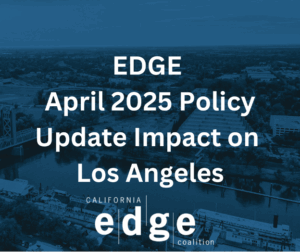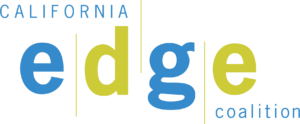
Following the Legislature’s spring recess from April 10 through April 21, lawmakers returned to a packed schedule of policy committee hearings. A variety of bills impacting workers, opportunity youth, and returning students were heard, debated, and, where approved, voted out of committee. These measures then advanced to the next stages of the legislative process, carrying significant implications for California’s workforce and overall economic vitality.
May 2nd marked the last day for policy committees to report any bills with state-cost implications to the Assembly and Senate Appropriations Committees. Those committees then weighed each proposal at their suspense hearings on May 22nd, where decisions were made on which measures would proceed to the floor for a vote. With so much budget uncertainty on the horizon, EDGE remains fully committed to advocating for the protection and expansion of investments that help Californians address basic needs and access life-changing education and training programs.
Below is a list of bills EDGE is closely tracking. An official position is noted if it has been approved by our coalition. This is a dynamic list that will be updated as we continue to analyze legislation and as bills move forward, or not, this session. For more information about our positions on specific legislation, please contact Jason Henderson, Policy Analyst, at jhenderson@caedge.org.
View EDGE’s general policy update for April 2025 here.
View our budget priorities here.
AB 537 (Ahrens) CA College Promise for All. This bill expands the California College Promise program, which currently only allows full-time community college students, to include part-time students as well. This change allows colleges to waive fees for all students, regardless of enrollment status. By extending access to part-time learners—many of whom are balancing work and education—this bill supports a more inclusive pathway to higher education and the workforce. Factsheet.
Position: Support
Status: Assembly Appropriations Committee (05/23/2025) – Suspense File
Impact on LA: AB 537 would likely be transformative for Los Angeles, unlocking tuition-free access for thousands of part-time students who are currently excluded from the California College Promise program. This proposal could yield widespread benefits across education, workforce development, and social equity in one of the state’s most diverse and economically robust regions. It would increase college enrollment and retention, especially in underserved communities.
The California College Promise Grant (CCPG) is the most common fee waiver for students, which waives the per-unit enrollment fee charged by California Community Colleges (CCC). The waived enrollment fee is $46 per unit.
The monetary impact of the AB 537 fee waiver expansion for part-time students could range from $46 to $552 per semester, depending on the number of units a student takes. Over two years (four semesters), a part-time student could save approximately $2,208 in waived enrollment fees, representing a possible maximum savings of $1,104 per year.
In Los Angeles, part-time enrollment is disproportionately high among low-income students, single parents, immigrants, and adult learners. These groups are often balancing work, family responsibilities, and other responsibilities that limit the time they can devote to school. AB 537 can help reduce the financial pressure and improve pathways to economic mobility by enabling them to complete degrees or certificates over time without accumulating debt.
Los Angeles is home to one of the largest concentrations of community college students in the state, with institutions like L.A. City College, East L.A. College, and L.A. Valley College serve tens of thousands of students, many of whom are enrolled part-time. AB 537 could open tuition-free access to a majority of CCC students (nearly two-thirds statewide are part-time).
Not only does AB 537 benefit individual students by expanding access, AB 537 supports Los Angeles’ broader workforce development goals. Los Angeles employers in healthcare, education, technical and skilled trades could benefit from a more diverse and better-educated labor pipeline, with increased participation in certificate and associate degree programs that align with labor market needs.
Fee waivers in California’s community college system are more than financial aid tools that eliminate the cost of enrollment fees for eligible students, they are transformational mechanisms for low-income students in Los Angeles County. They are intended to reduce the financial barrier to accessing higher education, enabling working students, caregivers, and non-traditional learners in Los Angeles to continue their education and training without the burden of tuition.
SB 575 (Laird) California Cradle-to-Career Data System – Earnings Data Gap. This bill allows the Franchise Tax Board to share limited earnings data with the Cradle-to-Career system to verify income and match existing records. This will help C2C better understand earnings and workforce trends for full-time workers without college degrees and college-goers working as independent contractors, especially those who have not participated in California’s public higher education institutions. Factsheet.
Position: Support
Status: Held in Senate Revenue and Taxation Committee (04/23/2025) Two-Year Bill
Impact on LA: SB 575 has the potential to inform Los Angeles policymakers with a more complete picture of how local education systems, from early childhood through high school, translate into economic outcomes, especially for residents who do not pursue higher education. According to 2023 estimates, approximately 64.5% of residents aged 25 or older in the county have not completed a bachelor’s degree, and around 19.3% have not graduated from high school. While in the city of Los Angeles specifically, about 37.17% of residents aged 25 or older hold a bachelor’s degree or higher, indicating that roughly 62.8% have not attained this level of education. (“Educational Attainment,” n.d.)
By allowing access to limited earnings data, SB 575 can fill critical gaps in longitudinal data connecting educational pathways (especially for those not pursuing college) to employment and income outcomes. This can lead to more targeted workforce development programs in Los Angeles, better-informed decisions on investments in K–12 education, apprenticeships, and social services, and enhanced support for alternative career pathways like trades and gig economy work –as of 2019, Los Angeles County had approximately 1.1 million gig economy workers, marking a 21% increase from 2016, indicating a growth in freelance employment.
A significant portion of Angelenos, particularly those from historically marginalized communities, may not attend college yet still contribute actively to the economy through self-employment or non-traditional jobs, which are separate from that of gig economy work. SB 575 helps identify earnings and job patterns among these groups.
More inclusive earnings data can provide community organizations based in Los Angeles with evidence to track the long-term effectiveness of programs like career technical education (CTE), ultimately aligning high school curricula more closely with labor market needs, providing tailored career counseling, and resource allocation.
Lastly, further integration of earnings data into the C2C system would support facilitation of stronger coordination among LAUSD, community colleges, city workforce boards, and nonprofit partners, improving service delivery and outcomes.
SB 575 stands to significantly bolster Los Angeles’s ability to target and act on the economic realities of its diverse population. By addressing existing blind spots in earnings and employment data, Los Angeles can craft more inclusive and effective regional policies for education, workforce development, and social equity.
AB 731 (Fong) College and Career Access Pathways – Dual Enrollment Partnerships. This bill removes key barriers to make CCAP dual enrollment more accessible and equitable for all students. It simplifies the application process, eliminates the need for principal approval, and offers flexibility on the 15-unit cap. Building on AB 368 (Holden, 2022), AB 731 also shifts reporting requirements to focus on student outcomes, such as certificate completion, transfers, and overall success, giving the state better tools to evaluate dual enrollment impact. Factsheet.
Position: Support
Status: Pending in Assembly Appropriations Committee (05/23/2025) – Suspense File
Impact on LA: Los Angeles Unified School District (LAUSD) serves a high proportion of low-income, Latino, Black, and first-generation students. These communities stand to benefit significantly from the passage of AB 731 with streamlined application processes and the removal of potentially biased administrative approval. These reforms align with LAUSD’s equity-focused college readiness goals, expanding access to college-level coursework across all demographics.
By authorizing both asynchronous and synchronous online CCAP courses, AB 731 supports students who juggle part-time jobs and family responsibilities, offering the flexibility they need to succeed. This is especially important in Los Angeles, where transportation and scheduling challenges often inhibit access to in-person classes. Long commutes and inconsistent transit options—particularly in East and South L.A.—can create significant barriers to participation, making online modalities a critical tool for expanding equitable access to dual enrollment opportunities.
L.A.’s education partners — including LAUSD, the Los Angeles Community College District (LACCD), and nonprofit partners — will benefit from enhanced CCAP data reporting, which can drive better decision-making and resource allocation, inform strategies to scale effective dual enrollment models across schools, reveal participation gaps by race, income, and geography.
AB 1122 (Bryan) Universal Access to Dual Enrollment. This bill promotes universal access to dual enrollment by 2030 through targeted, equity-driven reforms. It requires all school districts to offer dual enrollment opportunities, with a focus on underserved communities. Aligned with the Governor’s Master Plan on Career Education, the bill positions dual enrollment as a key strategy for preparing students for college and careers. Factsheet.
Position: Support
Status: Held in Assembly Education Committee (4/30/2025) Two-Year Bill
Impact on LA: Los Angeles has a diverse, high-poverty student population across the LA Unified School District (LAUSD) and surrounding districts. AB 1122 could address inequities in college access by mandating dual enrollment opportunities in schools serving predominantly BIPOC, low-income, and first-generation college students. This could result in improved college readiness for students who might be discouraged from pursuing higher education. Ultimately, reduce disparities in postsecondary outcomes by offering early exposure to college-level work in high school.
Many students in L.A. face economic and familial responsibilities that can delay or derail their postsecondary education. Dual enrollment can reduce the cost and time needed to earn a college degree. Specifically, access and completion of dual enrollment aligns with LAUSD’s growing focus on career pathway models.
AB 1122 could provide strategic opportunities for Los Angeles by offering systematic solutions to support LAUSD’s equity-focused graduation and college access strategies. Partnership development and collaboration between LAUSD, LA County Office of Education, and the community colleges serving LA will also directly address barriers to access higher education.
